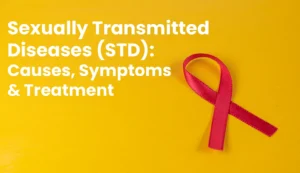Diabetes is a metabolic disease accelerating worldwide along with modern lifestyle changes. The condition is responsible for serious health problems such as blindness, kidney failure, heart attacks, stroke, and lower limb amputation.
Few conditions are as complex and debilitating as diabetes, but the condition can also have a profound impact on fertility in men and women with the condition.
When you have diabetes, you’ll want to know how it can impact your fertility and what you should do. Diabetes can make getting pregnant more complicated, and it’s something that should be taken seriously.
As of 2022, India has estimated more than 77 million individuals with diabetes, roughly 1 in 11 Indians, making it second most affected worldwide. A government survey also found an 11.8% prevalence of diabetes in India in the last 4 years.
While Diabetes is a condition that can’t be described in a single article, here, you’ll learn about the ways diabetes can have a negative impact on your reproductive health and how you can manage it.
Understanding Diabetes & Its Complications
Having diabetes means your body isn’t normally processing or using the glucose from the food you eat. In other words, it happens when your bloodstream’s sugar (glucose) level rises because your body isn’t taking the required glucose into its cell and using it for energy.
If the condition is left untreated, it can cause severe complications over time, such as:
- Eyes & kidney damage
- Nerve damage
- Skin infection
- Hearing loss
- Erectile Dysfunction
- High blood pressure
- High cholesterol
- Dental problems
- Depression
- Atherosclerosis
- Chest pain
There are different types of diabetes happening for different reasons but resulting in too much sugar in the blood. Diabetes can seriously affect your healthy lifestyle and, in some cases, may be a life-threatening disease. In fact, deaths due to diabetes accounted for nearly 4% of all deaths in India.
Types of Diabetes
1. Type 1
An autoimmune disease wherein the pancreas does not make enough insulin, and the immune system destroys the insulin-producing cells in the pancreas. Type 1 diabetes accounts for up to 15% of all diabetes cases, most of which are children and young adults.
2. Type 2
This type of diabetes occurs wherein the insulin produced does not work as it should, and your body becomes resistant to insulin resulting in too much sugar in your blood. Type 2 is the most common type of diabetes, accounting for up to 90% of all cases. The condition is commonly seen in middle-aged or older people.
3. Gestational Diabetes
It generally develops during a woman’s pregnancy when her blood sugar level increases. While in some cases, it goes away after pregnancy is over. However, you may be at higher risk of developing Type 2 diabetes.
How to Know If You Have Diabetes?
Depending on the type of diabetes, you may experience certain signs & symptoms. People may not have obvious symptoms, especially if they have type 2 diabetes. However, in type 1 diabetes, you may quickly able notice the following:
- Tired feeling
- Blurry vision
- Abnormal weight loss
- Frequent urination
- Slow-healing sores
- Presence of ketones in the urine
- Skin or vaginal infections
- Dry mouth
- Itchy skin
- Pain or numbness in your feet
How Can Diabetes Affect Your Fertility?
Diabetes can have a significant impact on fertility. The hidden danger of this common condition is that it can lead to reproductive problems, as it damages the blood vessels carrying oxygen and nutrients to the embryo. This results in a higher risk of miscarriage and other complications during pregnancy.
Diabetes can also impact fertility by causing hormone imbalances. When you have diabetes, your body has trouble using the hormone insulin to control blood sugar levels, and this can cause a hormonal imbalance, which in turn can make it difficult to conceive.
People with type I diabetes and type II diabetes can develop problems with their fertility. Both men and women can experience problems with fertility. Therefore, It’s essential for people with diabetes to learn about their options for having a baby.
Diabetes and Female Infertility
Many things can affect a woman’s fertility, and diabetes is one of them. Diabetic complications, PCOS (polycystic ovary syndrome), or autoimmune diseases can all contribute to lowered fertility rates. Obesity and being underweight can also play a role.
In fact, diabetes is the leading cause of pregnancy-related deaths in women.
When a woman has diabetes, her body may not be able to produce enough insulin, which is required to convert sugar into energy. It’s crucial to maintain the proper blood sugar levels in order to conceive naturally.
Here are some of the other risk factors:
- In early pregnancy, women with hyperglycemia (high blood glucose) have a five-fold increased risk of pregnancy complications, including intrauterine growth retardation (low birth weight).
- Women with gestational diabetes have a two-fold increased risk of developing hypertension in late pregnancy and are more likely to develop obesity during the subsequent pregnancy.
While it is true many women with diabetes can conceive without difficulty, in some cases, diabetes can make it harder for a woman to get pregnant.
That’s one of the reasons why doctors recommend that women with diabetes take extra precautions to reduce their risk of complications during pregnancy.
Diabetes & Male Infertility
Diabetes can also cause fertility issues in men. In fact, men are more likely than women to develop type 2 diabetes. It can lead to erectile dysfunction in men that may be associated with the inability to conceive.
Diabetes can affect male fertility in several ways, including:
- Decrease sperm quality
- Erectile dysfunction
- Ejaculatory dysfunction
- Abnormal or malformed sperm
- Retrograde ejaculation
How to Manage Diabetes?
If you’re diagnosed with diabetes or have initial signs, then regularly checking your blood sugar level is essential as it helps guide the decisions about what medications to use, what to eat, your physical activity, and insulin adjustments.
As of now, there is no cure to prevent type 1 diabetes, you must take insulin every day. But choosing a healthy lifestyle can help manage type 2 diabetes, gestational diabetes, and prediabetes. This includes –
- Consult a doctor and follow a diet plan
- Eat healthily (fruits, vegetables, beans, nuts, etc.)
- Regular physical activity
- Maintain your blood cholesterol
- Reduce stress
- Quit smoking
- Maintain healthy weight
- Take proper medications & insulin, if prescribed
- Cut back on alcohol
Takeaway
If you have diabetes, fertility may be on your mind. After all, one of the most common questions asked of people with diabetes is whether or not they can have children.
The answer isn’t always straightforward, as diabetes can impact fertility in both men and women. In general, however, people with diabetes can conceive and carry a child to term successfully.
If you have trouble conceiving, talk to a doctor about whether or not diabetes may be a factor. In case you’re diagnosed with infertility, there are infertility treatments in Pune available such as In vitro fertilization (IVF) or other assisted reproduction techniques to help you conceive.
So, get in touch with fertility experts at Crysta IVF. As highly experienced specialists, they’ve witnessed & treated many women with diabetes to have healthy pregnancies and deliver healthy babies.




